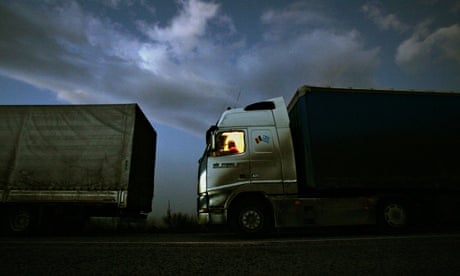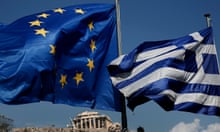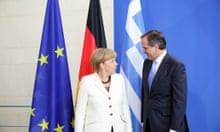A week after Russia banned European Union food imports in a tit-for-tat move for sanctions imposed over Ukraine, Greek farmers say the embargo has already dealt a devastating blow to the country's agricultural economy.
At least 3.5m kg of peaches aloneare said to have rotted in fridge trucks turned back from Russia, and fruit producers have warned of calamity for a sector highly dependent on the market.
"Russia absorbs more than 60% of our peach exports and almost 90% of our strawberries," said Christos Yannakakis, who presides over Greece's largest regional association of growers and cooperatives.
"It is hugely important that the EU offers help otherwise our agricultural economy will collapse," he told the Guardian ahead of an emergency meeting in Brussels on Thursday to discuss the impact of the ban across the 28-nation bloc.
Fruit farmers described scenes of mayhem with hundreds of trucks carrying consignments of fruit now lining the roads of Bulgaria, Romania, Moldavia and Ukraine after being forced to return from the Russian border.
An estimated 15,000 families in the fruit-producing regions of northern Greece survive on the industry, according to producers.
"There are around 3.5m kilos of peaches currently rotting in trucks and at the height of the summer another 3.5m kilos have yet to be harvested," said Apostolos Keranis head of the federation of Greek truckers. "We're talking about huge, huge damage."
In Macedonia, farmers spoke of their despair of not knowing how to deal with the rotting produce.
"We are in a state of absolute desperation. We don't know what to do," said Konstantinos Tampakias at the Agricultural Association of Naoussa, where orchards yield apples, cherries and kiwis also destined for the Russian market.
Moscow has vowed the retaliatory measure, which also applies to products from the US, Australia and Canada, will last 12 months.
Roughly 10% of the EU's agricultural exports, worth around €11bn (£8.8bn) go to Russia every year, European commission figures show. Outside the EU, Russia is Greece's biggest trading partner, with the value of total trade between the two countries surpassing €5.7bn last year, according to the Hellenic Statistical Authority.
Greek producers speak of losses that will exceed €178m from fruits and conserves over the course of the year.
With farmers in countries from Finland to Italy also up in arms, the EU commission on Monday set up a taskforce to assess the situation. Officials have not ruled out financial compensation. The European agriculture commissioner Dacian Ciolos pledged the sector would "re-orient rapidly toward new markets and opportunities" to overcome the crisis.
But Greek farmers dismissed the claim saying efforts to penetrate western markets had proved nearly impossible over the last decade. "We've worked very hard to access the Russian market because it's so impossible to penetrate markets elsewhere," added Yannakakis. "In the EU we face immense competition from Italy and Spain. I personally tried earlier this year to get our produce into the big European chains and they weren't interested because it is not packaged and washed in the way that they want for consumers. Russia on the other hand likes the fruit as it is, straight off the tree."
The embargo has put the fragile coalition of prime minister Antonis Samaras on the defensive, with the government conducting behind-the-scenes diplomatic talks in a bid to come to a compromise with the Kremlin while appearing not to step out of line with its EU allies.
Confronted by growing demands for preferential treatment from producers, senior officials have promised recompense, but readily acknowledge that finding the funds will be hard when the debt-stricken country is only just beginning to emerge from its worst crisis in modern times. Greece has already been hit by a precipitous drop in foreign visitors from Russia following the insurgency in Ukraine.
Wading into the crisis, Greece's second world war hero and veteran leftist Manolis Glezos penned an emotional letter to the Russian president Vladimir Putin last week appealing for Moscow to exempt Athens from the measure. "We appeal to your humane feelings and the traditional friendship between our peoples," wrote the 92-year-old MEP listing the occasions when Greece had openly opposed its EU partners in international affairs stretching from the US-led bombing of Serbia in the 90s to the 2003 invasion of Iraq. "I plead that you not impose an embargo on Greek products."
The government spokesperson Sophia Voultepsi said Greece would not sacrifice its foreign policy to the farmers. "You cannot base your foreign policy on peaches," she said. "There is a big difference between compensating farmers and changing your alliances."
But summing up farmers' fears, Yannakakis said: "It's peaches today, but later in the year it will be apples, cherries, kiwis and strawberries, a catastrophe for us and our economy at such a difficult time for Greece"




Comments (…)
Sign in or create your Guardian account to join the discussion